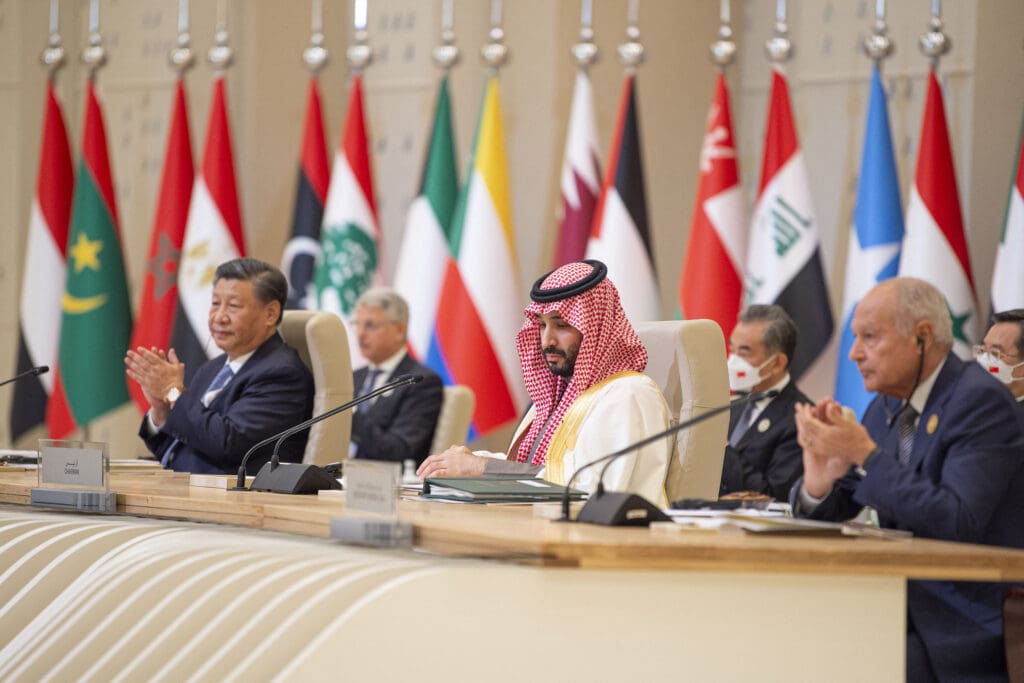Since the launch of its Belt and Road Initiative in 2013, China has markedly expanded its trade, industrial investment and other economic activities in the Middle East. As its influence has grown, regional governments like Saudi Arabia, Iran and Türkiye have urged Beijing to play a greater role in the Middle East’s security affairs. These calls escalated in the wake of October 7, 2023, as many in the region reacted in dismay at the responses of the U.S. and some Western European countries, which offered near-unwavering support to Israel. In addition to this encouragement, China has its own reasons to strengthen its security engagement: its need to safeguard maritime trade routes, its responsibilities as a major global power, and its desire to promote its national security through international cooperation.
At the same time, these drivers are constrained by three key factors. The first is Washington’s continued regional hegemony, especially the maintenance of the security umbrella the Gulf states have long relied upon. Recent developments—including Washington’s 2023 defense deal with Bahrain, designation of Qatar as a “major non-NATO ally,” and endorsement of the UAE as a major defense partner—suggest this tradition is far from dead. Donald Trump’s return to power may further reinforce Washington’s regional security role, with more arms sales to Gulf states, attempts to promote the Abraham Accords normalization framework with Israel, and a possible enhanced defense agreement with Saudi Arabia. For China—which has consistently avoided direct confrontation with the U.S. and the emergence of a “new Cold War”—this limits its role in the Gulf’s security landscape, where its economic interests are most substantial.
The second factor is the fundamental difference between China’s foreign policy doctrine and those of Western nations. Since the end of the Cold War, China has sworn itself to non-alignment and opposed interference in other countries’ domestic affairs. It has maintained this policy despite crises in the Taiwan Strait and the South China Sea, and throughout the wave of boycotts and sanctions by Western countries after 1989.
In contrast to the “rules-based” international order dominated by the West, China advocates for multilateralism and for tackling challenges through global cooperation. Western powers have often broken those same rules, transgressing their own notions of national security, sovereignty and independence—especially in the Middle East. This means weaker states often see military alliances as valuable ways of ensuring their security. China, by contrast, advocates for resolution through international law and multilateral mechanisms like the UN. Furthermore, it views military alliances as inherently antagonistic tools that consolidate the security of their members while souring relationships with others.
Growing instability in the Middle East has highlighted the limitations of military alliances in ensuring national security and regional stability. Yet if regional countries continue to view such arrangements as indispensable, they will likely retain their dependence on the United States. Even if Washington abandons this role, Beijing’s stated principles suggest it is unlikely to step in as a direct security provider.
The final constraint on Chinese security engagement is the growing trend toward strategic and economic autonomy among Middle Eastern countries. For example, in 2022, Saudi Arabia launched a rapid drive to fill 40 percent of professional roles in certain industries by Saudi nationals. While aiming to boost local employment, Riyadh also seeks to reduce dependence on foreign expertise in strategic sectors, directing over 50 percent of defense spending toward domestic firms by 2030.
Although not explicitly stated, these efforts reflect a broader desire among Arab states of the Gulf to roll back the influence of former colonial powers, including the U.S., whose reputation among Arabs is at a historic low over its support for Israel’s actions in Gaza and elsewhere. Yet these ambitions for greater autonomy in national strategy, military development, technology and diplomacy also imply the need for independence from other powers—including China.
Alternative Strategies for Security Engagement
All these factors demonstrate that China’s role in Middle Eastern security remains highly constrained. While regional countries diversify their partnerships and reduce reliance on Western powers, they are unlikely to fully align with China, instead seeking balanced relationships with multiple players while preserving their own independence. Still, while China has not engaged directly in military operations or formed alliances, it has pursued alternative strategies for security engagement in the region, including building support bases, mediating conflicts and establishing a “comprehensive security architecture.”
China established its first overseas support base in Djibouti to support anti-piracy operations and safeguard its economic interests. Today, it is eyeing the possibility of establishing a base in the UAE as well. Chinese civilian ports overseas are often perceived as dual use, or functioning as de facto military bases, meaning that Chinese-run facilities such as Haifa Bayport in Israel and Alexandria Port in Egypt have provoked American opposition.
Beijing has also stepped up its mediation efforts since the successful Chinese-brokered restoration of diplomatic relations between Iran and Saudi Arabia in 2023. In July 2024, China mediated a reconciliation deal between 14 Palestinian factions. As the conflicts in Gaza and Lebanon threatened to ignite a region-wide war, Chinese Foreign Minister Wang Yi engaged with Egypt and Jordan to prevent further escalation and push for a ceasefire. Nevertheless, while China’s mediation has drawn attention, observers argue that these efforts have yet to significantly alter the region’s geopolitical dynamics, given Beijing’s limited regional expertise and influence.
China’s long-standing “peace through development” approach has achieved much more progress by leveraging trade, investment and economic and technological cooperation with the Global South. As of July 2024, more than 80 countries had joined the Chinese-led and funded “Global Development Initiative,” with around half signing memoranda of understanding with Beijing. Countries engaged in economic cooperation with China are seen as likely to pursue security cooperation, as has happened with Libya. By promoting stability and safeguarding China’s economic interests, these partnerships aim to resolve disputes through economic cooperation and mutual benefit, ease regional tensions and ultimately achieve collective security.
It bears noting that many in the West view this strategy with suspicion, arguing that China is using its economic clout to drive a wedge between the U.S. and its allies. This view holds that the Chinese are employing “economic coercion” against European, Australian and U.S.-aligned East Asian states, as well as economic and technological influence, to challenge U.S. interests in the Middle East.
China has also engaged in limited military exchanges and research collaborations with Middle Eastern countries, along with joint efforts against terrorism and the arms trade. These efforts represent early Chinese attempts to become involved in regional security affairs.
Pushing the West Out?
China’s leaders have taken to actively advocating for Arab interests, peace and security whenever conflict flares in the Middle East. China has also repeatedly called for an international peace forum on the Palestinian question. Yet, without support from the region itself, peace initiatives by major outside powers are largely symbolic. China has maintained that security dilemmas in the Middle East should be addressed by regional actors themselves.
While Beijing is unlikely to alter its doctrine of non-alignment in response to regional actors pushing it to do more, China is likely to continue expanding its influence in the Middle East through economic cooperation. Chinese leaders see the economy as the country’s primary source of strength. Economic cooperation brings financial benefits and supports industrialization in the Global South, in turn boosting China’s influence. As such, the country has little incentive for military interventions that would risk entangling it in intractable conflicts—as well as provoking both the U.S. and regional governments.
Nevertheless, China’s deep engagement in the Global South will inevitably push the U.S. and other traditional powers further out of the Middle East. With China’s advantages in technology, production and industrial abilities, this trend is already clear and set to shape the region’s geopolitics irrevocably.


